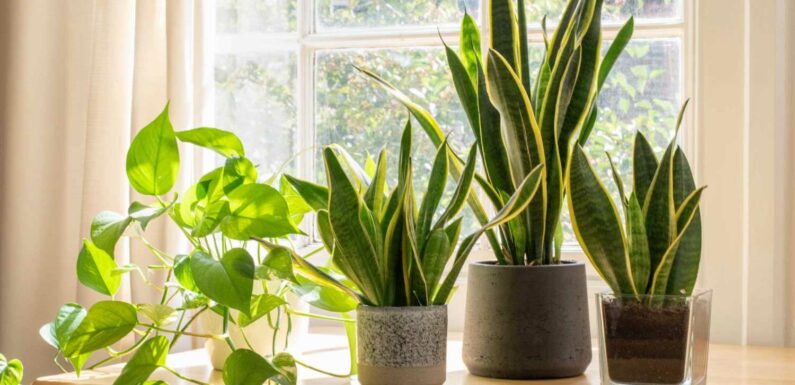
From feather dusters to microfibre cloths, we've all got our own preferred methods for removing cobwebs and dust from inside our homes.
But have you ever stopped to think that there may be an alternative solution? Houseplants.
Gardening expert Zach Morgan, a horticulturalist and gardening expert at Fantastic Gardeners, spoke to The Express and revealed seven houseplants that can help to remove dust and nasty toxins from the air.
So, why not give them a try?
Spider plant
If you're looking for a low maintenance plant that's easy to find and take care of, the spider plant is the best choice for you.
According to Zach, it's the perfect plant for pet owners because it's "not toxic and very resilient" and thrives best in indirect sunlight.
READ MORE ON GARDENING
We’re gardening experts – here’s all the jobs you need to do this January
I’m a gardening pro – four ways to reuse old Christmas trees in your garden
But there is one thing you need to remember – it needs watering a few times a week.
The gardening whizz says: “According to studies, spider plants are great at getting rid of formaldehyde from the air, so they can help you cleanse the air indoors by keeping them close to your workspace.
FABULOUS BINGO: Get a £20 bonus & 30 free spins when you spend £10 today
"It’s also said to remove carbon monoxide and xylene.”
Additionally, they absorb nitrogen dioxide which can help to keep the air circulating your home clean and fresh.
Most read in Fabulous
Harry must be stripped of Duke title for 'trashing' royal family, demand MPs
Harry reveals steamy details of sex with Meg after sneaking into Soho House
We drove four hours to go to the UK’s biggest B&M – it was so worth it
Mrs Hinch fans go wild for 65p kitchen staple that banishes window mould
Snake plant
The snake plant is renowned for being succulent, which means it's super easy to look after.
Zach explains that it's a great choice for keeping air inside the home clean and fresh as it releases oxygen into the air whilst removing other “harmful chemicals.”
Meanwhile, researchers at Harvard University found it to be one of the most oxygen-producing houseplants, helping you to breathe and sleep better.
English Ivy
If you frequently dye your hair at home, then it's worth investing in an English Ivy plant.
That's because it helps to reduce the levels of chemicals that can be found in several salon products, according to Zach.
He adds: “It’s also a great plant for the bathroom because it’s said to remove mould.
"However, English ivy is toxic to cats and dogs so if you have pets, make sure it’s completely out of their reach."
Easy to look after, the gardening whizz says an English Ivy plant needs to be given a generous amount of water and a few hours of direct sunlight every day.
Peace Lily
The peace lily is an ideal plant to be kept in the bedroom as it has a high transpiration rate meaning that when watered, it helps to bring moisture back into the room.
Zach explaims: “This reduces dust in the room and can remove any irritants to your eyes, nose and mouth."
However, the bad news is it's toxic to pets and needs a bit more TLC, as it requires morning sunlight only, misting and damp soil.
Aloe Vera
When you think of aloe vera, chances are its skin-soothing benefits instantly spring to mind.
However, it turns out it's also very effective in removing toxins from the air.
According to Zach, this type of plant should live in the kitchen so that it can get to work removing toxins that are commonly found in the likes of detergents and disinfectants.
Chrysanthemum
The Chrysanthemum is the perfect choice of plant if you're looking to add a pop of colour into a room.
But Zach notes there's another huge benefit.
“Chrysanthemums are at the top of the list when it comes to air purification and removing common toxins," he says.
"However, they only work when the flowers are in bloom (around six weeks) and are toxic to cats and dogs so you should be careful if you have pets.”
It should be kept damp and in the sunlight while inside, but can be moved outside when it turns warmer.
Weeping fig
A study by NASA found the weeping fig to be one of the most effective plants for removing airborne toxins from the air.
And the good news? It's easy to look after – it just needs keeping away from draughts and direct sunlight, while the soil needs to remain moist.
Source: Read Full Article






